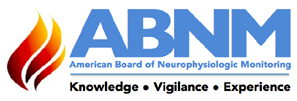| . |
VIII. ABNM Part II - Oral Examination:
The oral examination was developed because the Board felt that a written examination was insufficient to test the qualities of an individual it felt should be certified for aspects of monitoring beyond the technical level of knowledge and conduct of monitoring. It was felt that issues of interpretation, supervision, application of relevant anatomy and physiology and other issues would best be assessed by allowing candidates to verbally interact with examiners. More importantly, the reasoning and development of judgment as it relates to these aspects could be presented in an oral format that could not be tested adequately by a written examination. Further, the adaptability of a candidate to a changing environment such as occurs in the operating room is better tested in an oral format where a sudden change in the monitoring equilibrium can be introduced for the candidate to discuss. Finally, along with all these good reasons, the Board acknowledges the absence of unified standards for professional training in IONM and that a written examination alone cannot establish the competency of an individual.
As potential leaders in the field, candidates for examination are also required to have a broad and detailed understanding of the relevant scientific literature upon which intraoperative monitoring is based. It is not adequate to justify monitoring decisions by saying, “This is the way our service has always done it”. Instead, recommendations and decisions must be supported by reference to the clinical neurophysiology literature and/or to evidence-based medicine. The oral format has worked well in many certifying Boards where these aspects of judgment and adaptability are important components of the clinical responsibilities. The Board recognizes that the oral format is logistically awkward and inherently subjective. However, by preparing question topics before the exam and attempting to target judgment issues rather than knowledge issues, the Board believes the process is consistent, effective and fair. Further, the scoring process is designed to remove the possibility of one examiner unduly affecting the outcome of an examination (see below). It is anticipated that all individuals who demonstrate sufficient knowledge to pass the written examination, have sufficient experience in the operating room and a proficient knowledge of IONM literature, will have either faced the issues they will be asked or will have sufficient knowledge to present a well reasoned answer. In essence, preparation for the oral examination is in the daily experiences faced in the operating room. After successful completion of the written examination, registration for the oral examination is not automatic and one needs to apply specifically for the next available oral examination. However, the application is otherwise minimal as the candidate has already completed the application materials for the written examination and is “In the Examination Process”. The application may only be completed for the specific date of the next oral examination that is convenient for the candidate and the examination is offered once per year and may, at the discretion of the Board, be offered twice a year. Please note the assignment of the examination time will be based on a first come, first served basis, so please apply early if time constraints are a problem. Generally, the examination is held on a Saturday or Sunday and emphasizes scheduling exams in the morning to allow travel in the afternoon. The Board has developed the format below to make this process as effective and fair as possible. |

